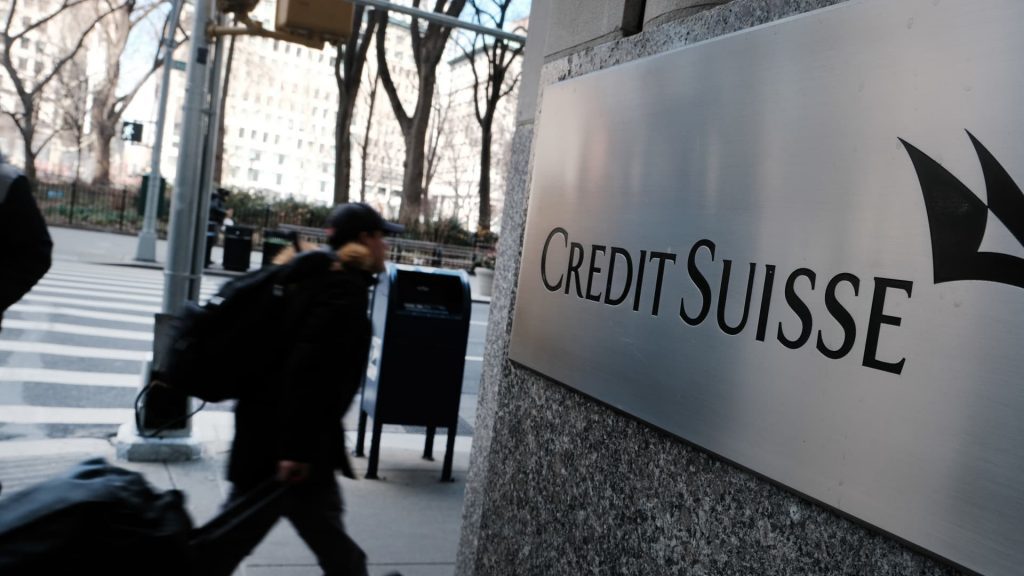Credit Suisse has declared that it will borrow up to 50 billion Swiss francs ($53.68 billion) from the Swiss National Bank using a covered loan facility and a short-term liquidity facility.
The decision comes after the lender’s stock dropped sharply on Wednesday, hitting a new low for the second day in a row, on reports that its largest investor, Saudi National Bank, would be unable to provide any further assistance.


With these new measures, “Credit Suisse is taking the necessary steps to create a simpler and more focused bank built around client needs,” the company said in an announcement.
In addition, the bank has announced that it will make a cash tender offer in connection with ten senior debt securities denominated in U.S. dollars for an aggregate consideration of up to $2.5 billion, and a separate offer in connection with four senior debt securities denominated in Euros for an aggregate consideration of up to 500 million Euros.
The CEO of Credit Suisse, Ulrich Koerner, has said that these steps show “decisive action” to strengthen the bank as it continues its strategic transformation to deliver value to its clients and other stakeholders.
We appreciate the support of the Swiss National Bank and the Swiss Financial Market Supervisory Authority as we implement our strategic transformation, he said.
“My group and I are committed to making quick progress towards delivering a less complicated and more customer-centric bank.”
Futures on the Dow Jones Industrial Average in the United States rose after the news was released, rising by more than 100 points. Futures for the S&P 500 and the Nasdaq 100 both increased by 0.45% and 0.5% respectively.
Some mild anxiety
CNBC reports that a representative from Saudi National Bank told the news network that Credit Suisse has not asked for financial assistance and that the widespread concern expressed on Wednesday was unfounded.
Credit Suisse’s largest shareholder, Saudi National Bank, was quoted as saying that its chairman, Ammar Al Khudairy, had not had any discussions with Credit Suisse about providing assistance.
There have been no talks since October, he told CNBC’s Hadley Gamble, so he has no idea where the word “assistance” came from.
The recent market turmoil in the banking sector, he continued, is “isolated” and the result of “a little bit of panic.”
On CNBC’s “Capital Connection,” he explained the precipitous decline of the banking industry, saying, “If you look at how the entire banking sector has dropped, unfortunately, a lot of people were just looking for excuses… it’s panic, a little bit of panic.”
Banking institutions that are ‘linked’
According to Daniel Tabbush, founder of the Tabbush Report, trust is a major issue for the banking industry as a whole in the wake of the Credit Suisse scandal.
He stated on CNBC’s “Street Signs Asia” that the central bank may have addressed this issue in whole or in part. “The obvious problem is a restoration of trust, and to stop the deposit flight.”
But the next order issue is “how this feeds through to so many interconnected banks where there are Credit Swiss contracts — where there are derivatives, where there are facilities,” he said.
Japan’s Topix index, which had fallen by more than 2% earlier, recovered some of its losses to trade down only 1.4% at its last close.
After dropping as much as 1.97% earlier, the Commonwealth Bank of Australia recovered most of its losses to trade 0.15% lower. Some of the losses sustained by Westpac Banking and National Australia Bank were reversed. Last time you checked, they were down 1.34 percent and 0.58 percent, respectively.
A few South Korean banks were down as much as 2% earlier before they began to recover.
After the news broke, the Swiss franc strengthened by 0.17 percent to 0.9315 US dollars, but it remained highly unstable. Currency markets in Japan saw the yen rise to 132.86 US dollars per 100 yen, a new high, against the greenback.
It was reported earlier this week that Credit Suisse chairman Axel Lehmann told CNBC’s Hadley Gamble that the recent collapse of Silicon Valley Bank is “local and contained.”
Lehmann responded, “We are regulated, we have strong capital ratios, very strong balance sheet,” when asked if he would rule out the possibility of receiving government assistance in the future. Everybody is pitching in right now. That’s not what this is about, then.




